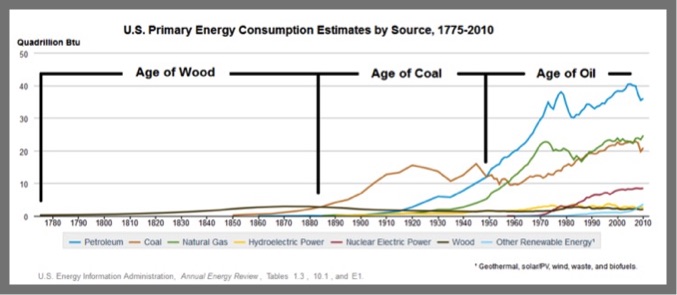Are renewables the answer?
© TIM Garrett 2014
This work is licensed under a Creative Commons Attribution-NonCommercial 4.0 International License.
It is argued that there are two fundamental challenges facing humanity over this century: running out of the easily accessible fossil fuels that support our civilization, and second, burning these fossil fuels will lead to a less hospitable climate. This would seem to pose the inescapable problem that, if civilization doesn’t collapse from running out of fuel, it will collapse from the environmental damages created by burning the fuel.
The obvious solution seems to be renewables. Solar and wind provide the energy that civilization requires to continue while not being based on combustion that leads to carbon dioxide emissions.
Sure, solar and wind has the issue of being either expensive or intermittent. But production prices keep falling, and with a continental sized electrical grid, it’s probably sufficiently windy or sunny somewhere. Remarkably, solar and wind seem to be succeeding.
With a renewable revolution, is our salvation at hand?
There are two considerations in this discussion that are rarely acknowledged. First, new sources of energy tend to add to past sources. Second, any source of energy, whatever its source, enables civilization to destroy its environment through extraction of matter.

Consider the figure above, which provides a broad brush view of energy consumption in the United States over the past couple of hundred years. Overall, total energy consumption has risen dramatically. With the establishment of European settlers, society was first powered off wood, adding coal to the mix around 1880, with non-solid fossil sources taking off around 1950. Nuclear and renewables have (so far) been smaller players.
There’s a couple of interesting things to notice about these curves. First is their shape: following an initial period of exponential growth, each source tends to plateau. Then, when new sources are added, they are additive: previously dominant sources do not decline, or at least not by much -- they simply become part of a larger mix. The curve for coal is particularly interesting. While there was marginal decline between 1910 and 1950, since then consumption of coal appears to have been resuscitated by oil and natural gas. Fluid fuels didn’t replace coal. In fact it was quite the opposite!
Why would this be? I think a case could be made that what is going on is that new energy sources grow civilization, thereby increasing all of its aspects, including population, vehicles, and homes, as well as their corresponding demand for all types of energy, irrespective of source. Energy supports the technological advances too that make previously inaccessible sources of energy more accessible. With oil, mechanized digging of coal is easier; with an explosion of human population aided by the fertilizer produced with oil, demand for coal produced electricity increases as well.
There are many physical analogs for this sort of behavior. To use the language of physics, we could think of an energy type as a “degree of freedom”. In low energy systems, certain possible degrees of freedom may be “frozen out”, and be inactive. With increasing energy added to the system, these degrees of freedom become active, but not at the sacrifice of those degrees of freedom that were previously active at lower energies.
So renewables are great as a substitute fuel for the purposes of slowing climate change, provided they actually replace rather than add to existing sources of energy. Unfortunately, it is not clear that there is any precedent for this sort of thing happening.
A second issue is that civilization is made of matter not energy. As it grows, it accelerates its rate of pollution as it goes. Acting as an open thermodynamic system, we use energy to extract raw materials from our environment in order to feed and grow our children, construct the stuff of civilization, and offset ever present decay. As we do so, resource extraction depletes the oceans of fish, the forests of trees, and the ground of minerals, leaving behind material waste that pollutes our land, water and air.
How can it be that renewables are any sort of environmental panacea if they simply add to the energy mix that we use extract raw materials from our environment and leave behind an ever growing pile of waste?
Whether the energy source is oil or solar doesn’t really matter. Energy of whatever stripe is used to acquire the raw materials from our environment that are needed to make up all the stuff of humanity, building more of us while leaving less of the environment in its wake. Sure, maybe renewables do not leave behind carbon dioxide in quite the same way as fossil fuels, but the energy they do provide helps contribute to our seemingly unstoppable conversion of matter from the environment into the matter that composes civilization.
So, even if sunlight and wind is seemingly infinite, our planet Earth is not. Any short-term material gain of ours is a loss for the world around us. Renewables only accelerate this process.
Economics About Physics of the economy What is wealth?
Energy, Innovation and growth Economic inertia Economic Forecasting Jevons' Paradox
Physics vs Mainsteam Economics Is Macroeconomics a Science? The economic heat engine
Economics and Climate GDP is not Wealth Are renewables the answer?
Is population growth a problem? Will growth transition to collapse?
What is your carbon footprint? Media Publications Presentations FAQ Criticisms
